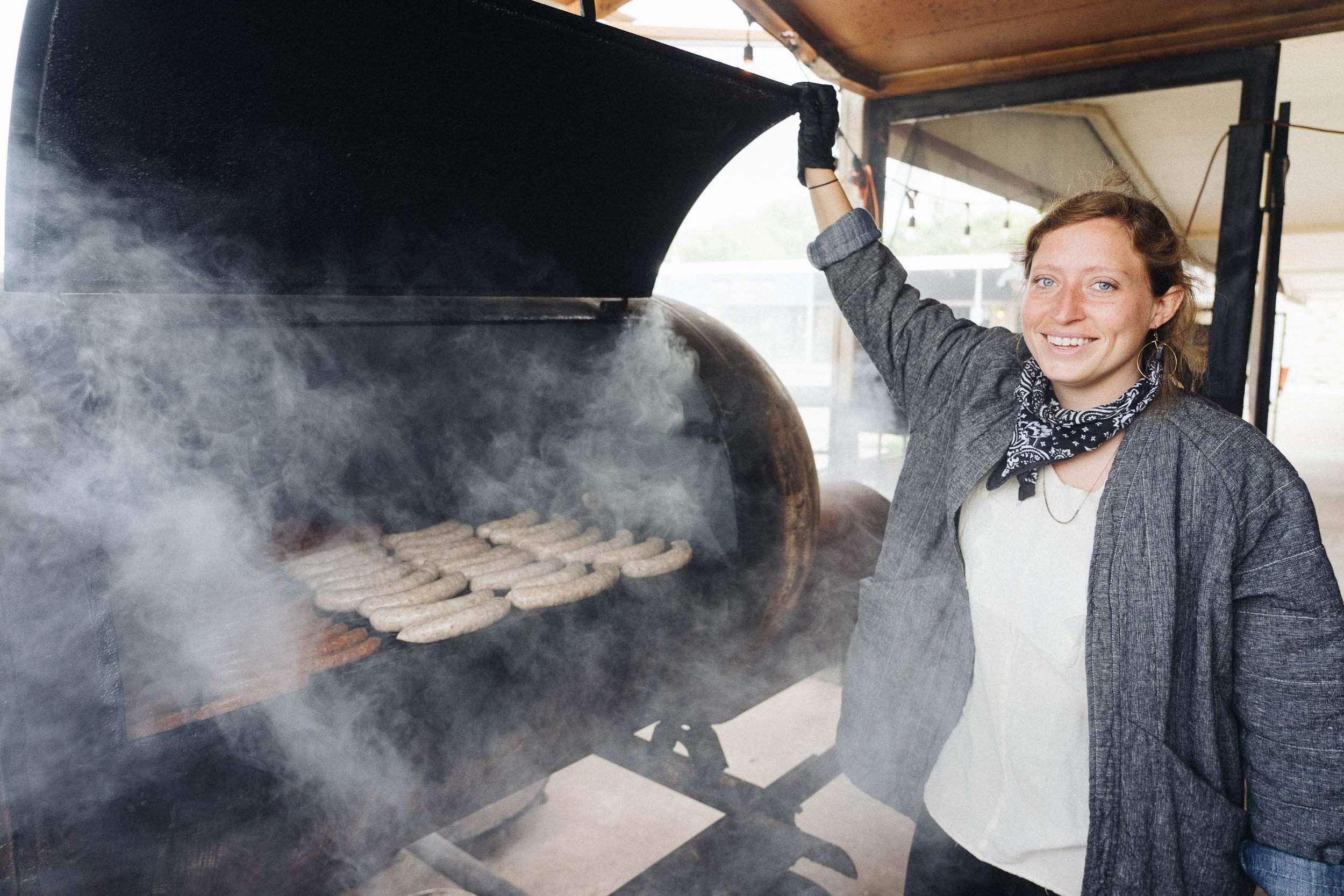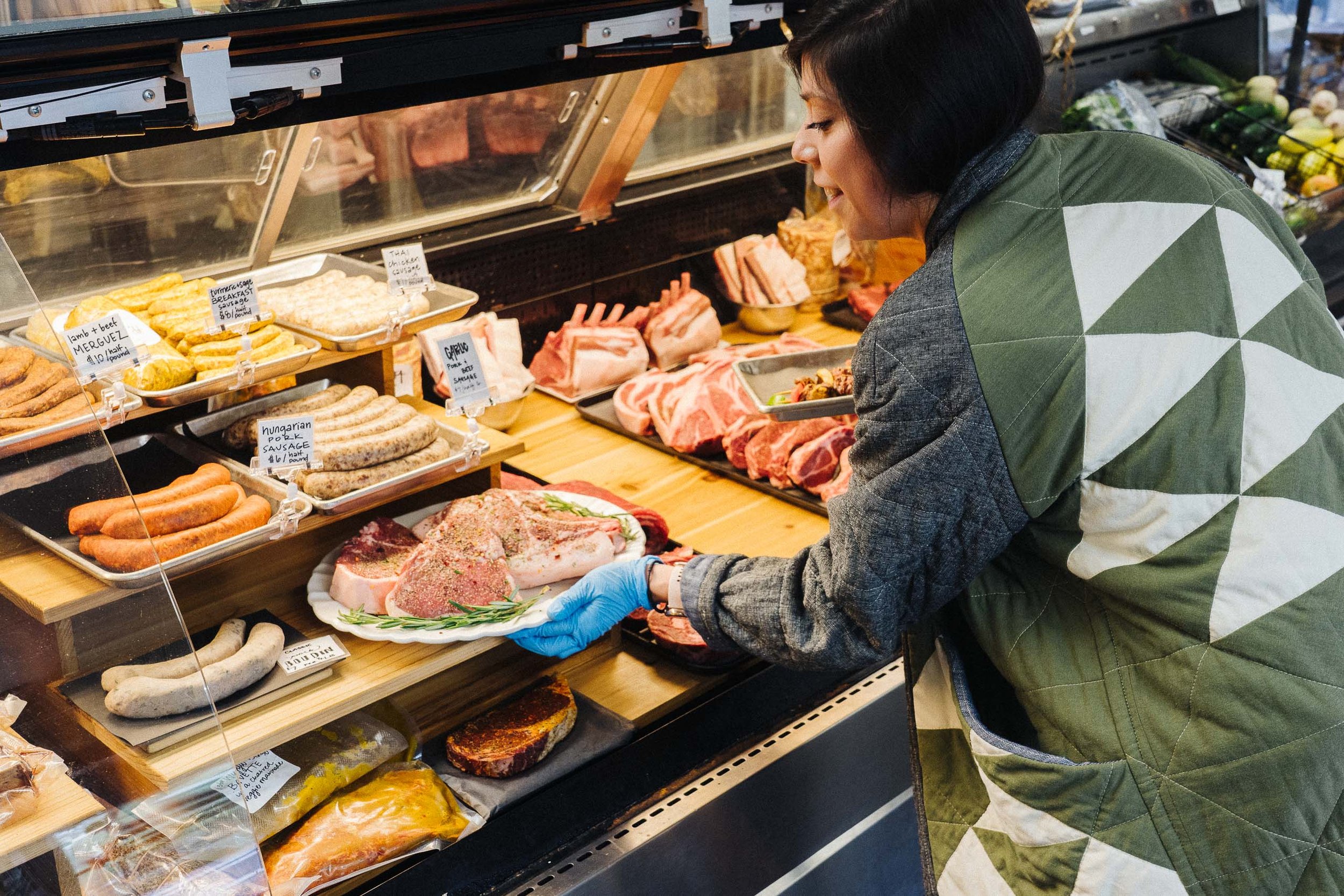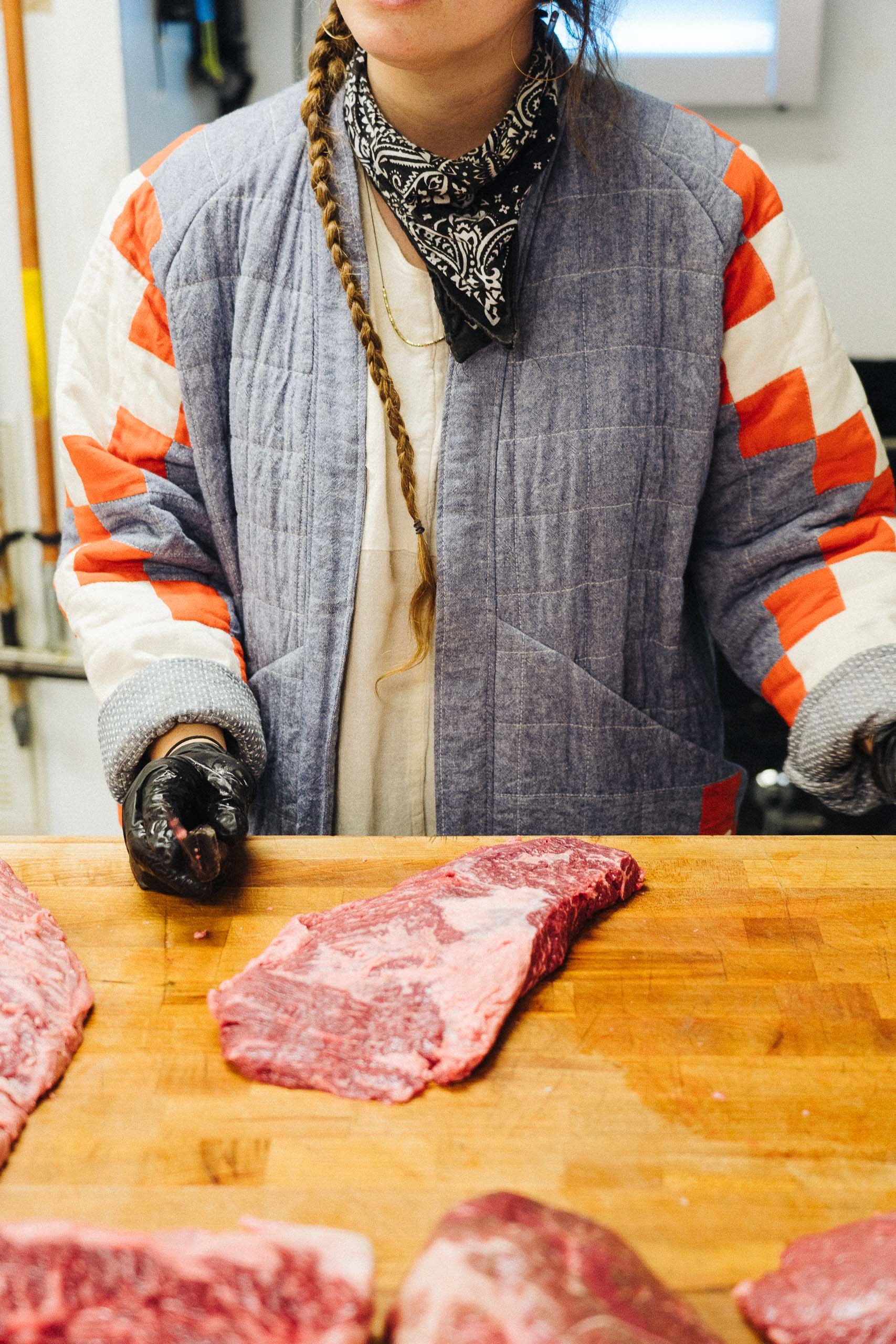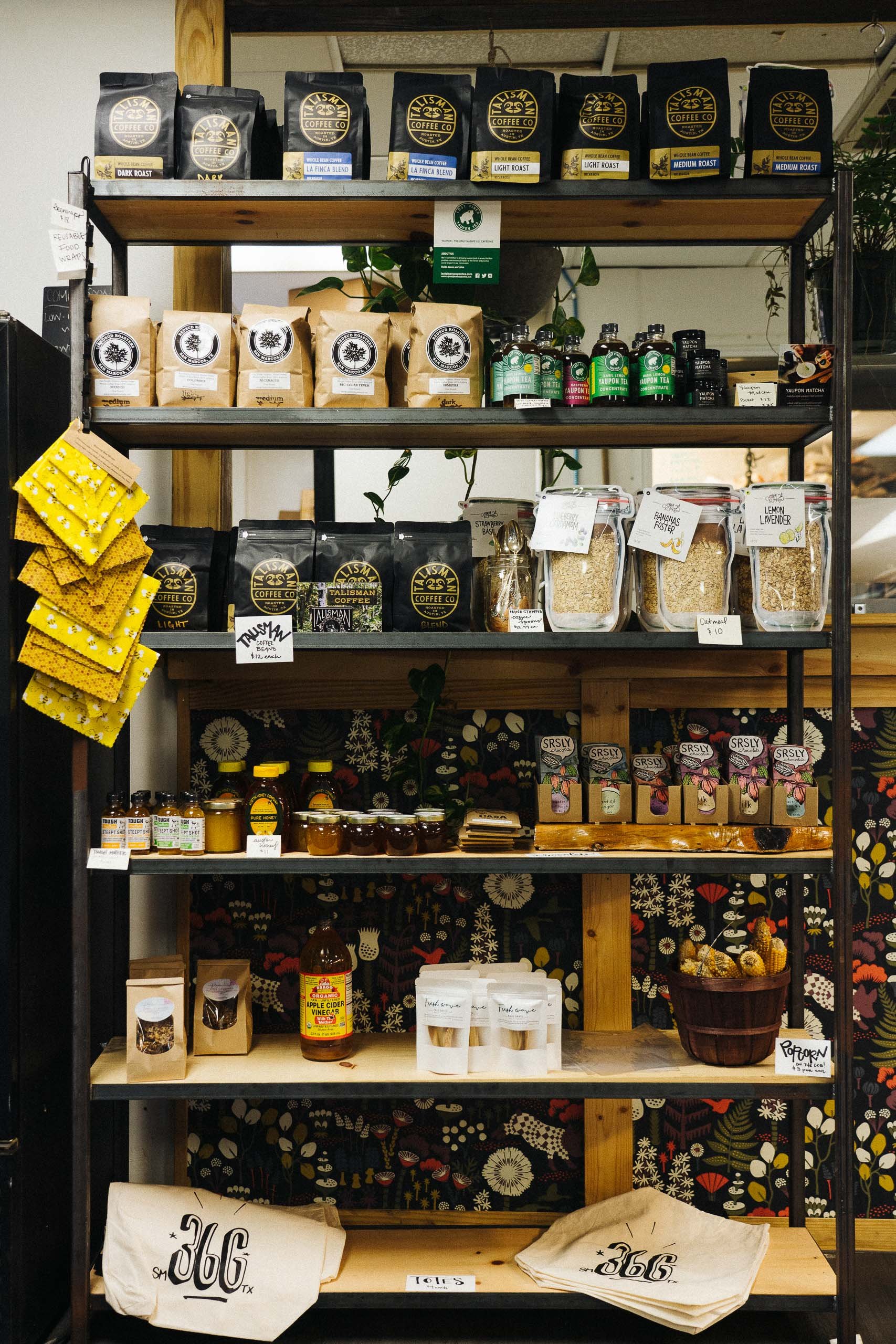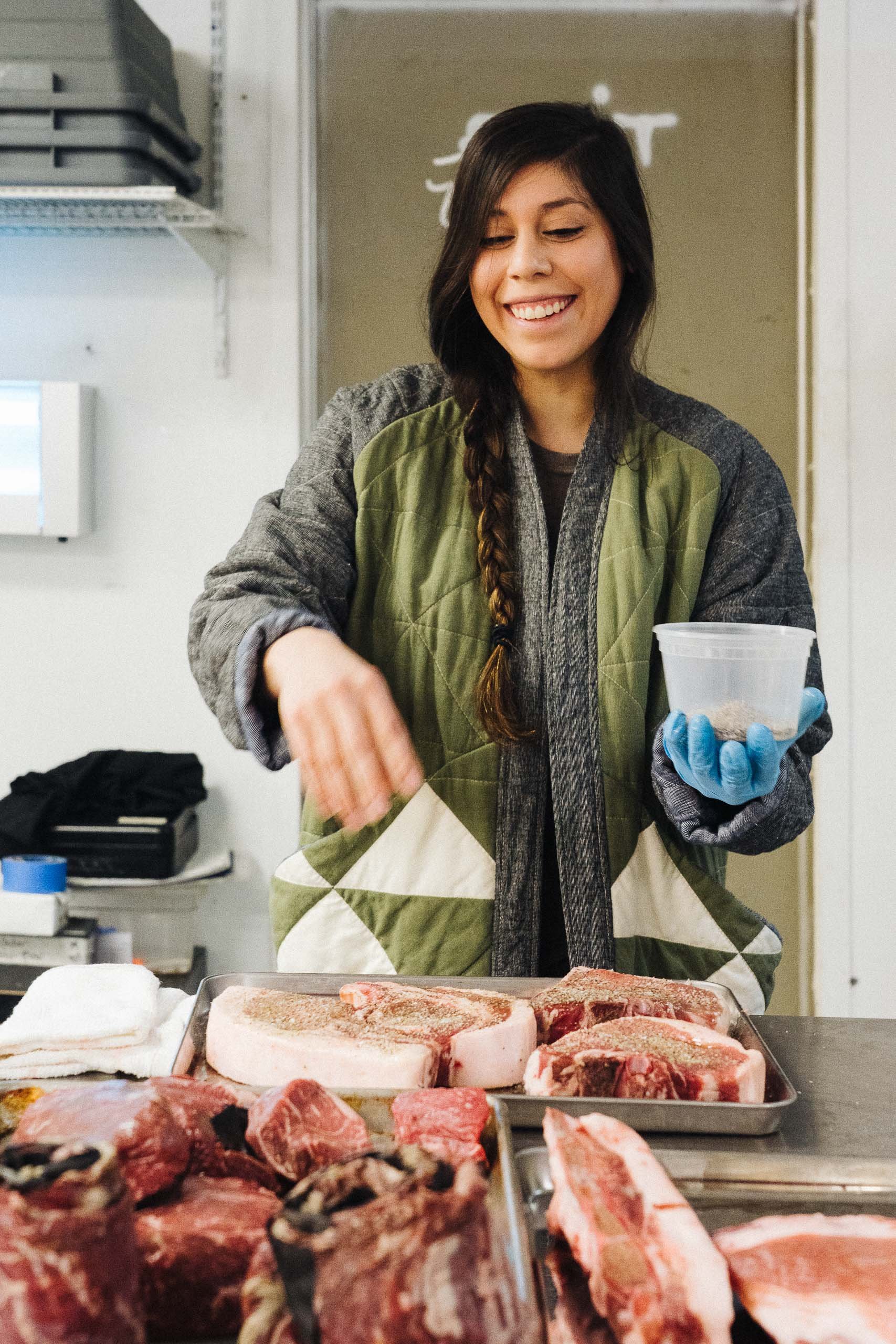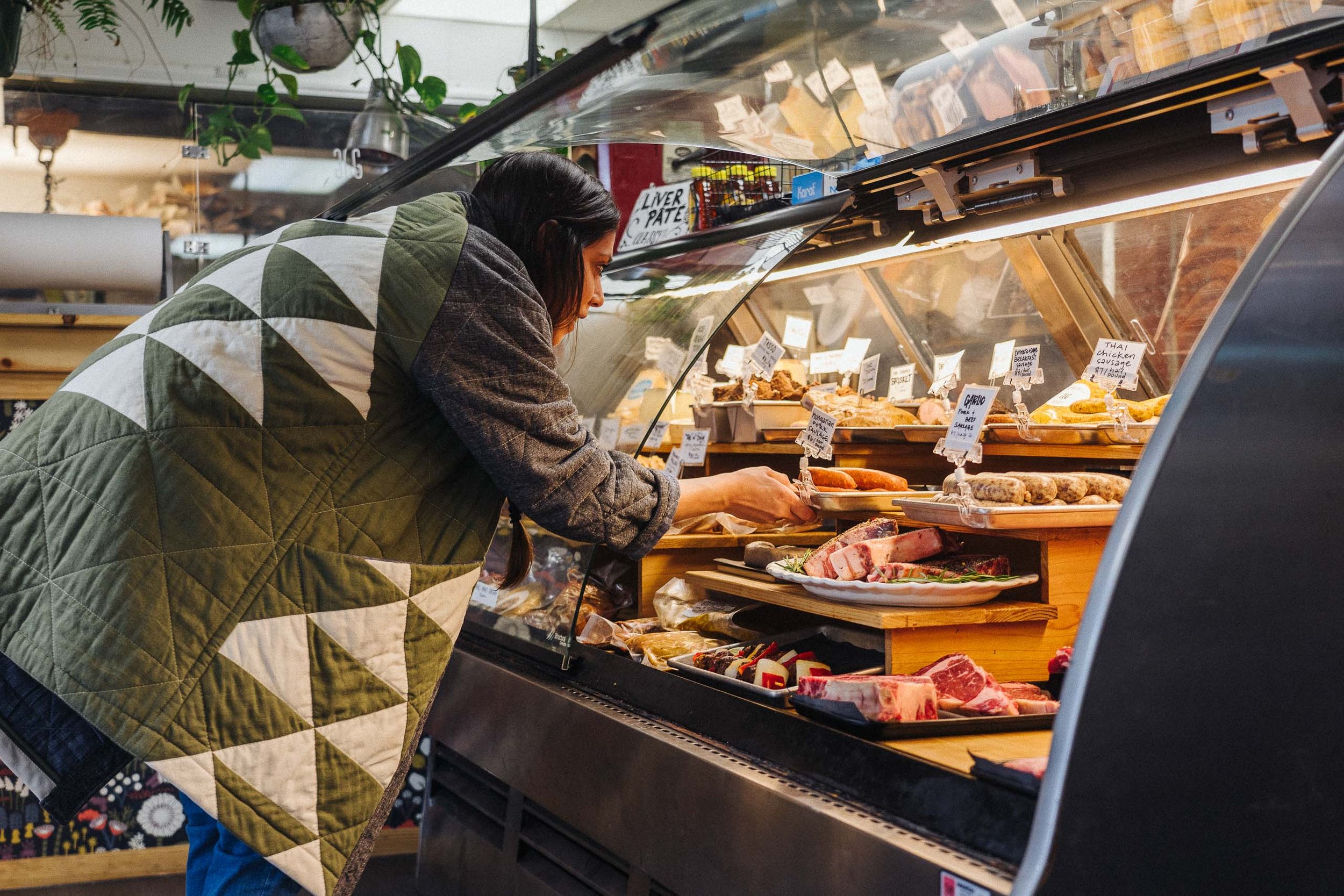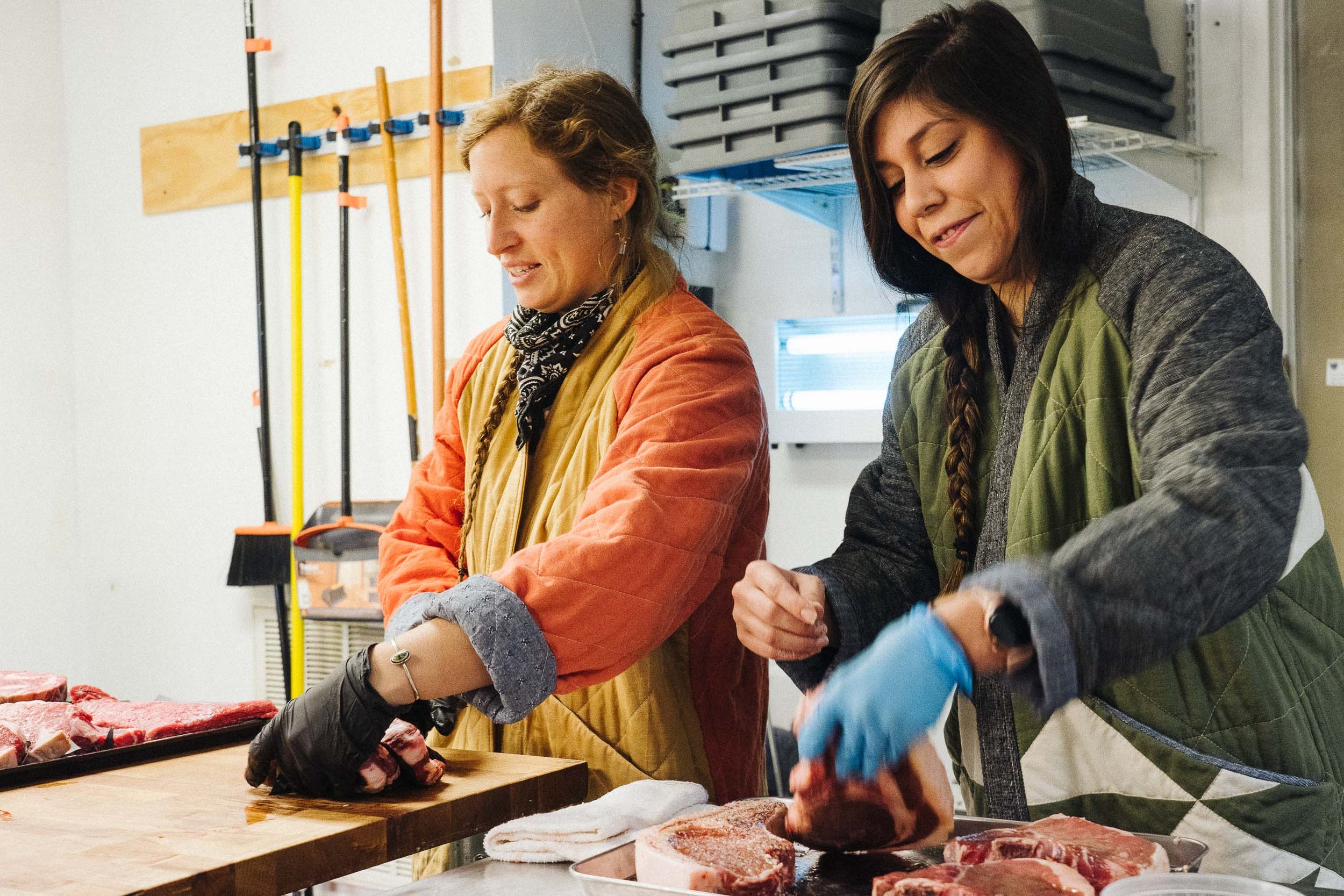COATED: Three Six General
COATED IS OUR SERIES OF INTERVIEWS AND PHOTO ESSAYS FEATURING SMALL BUSINESS OWNERS WHO ARE MODERNIZING TRADITIONAL BUSINESSES AND BRINGING HIGH QUALITY GOODS TO THEIR COMMUNITY. WE WANT TO HIGHLIGHT THESE FOLKS AND THE WORK THEY’RE DOING, SHARE OUR LOVE FOR REFRESHING + MODERNIZING TRADITION, AND SHOW OUR QUILT COATS ON A WIDER VARIETY OF BODIES AND GENDERS.
We spent the morning with Mattison Bills, the owner of Three Six General, a local butcher shop that straddles the edge of San Marcos, TX and the Texas Hill Country. She invited us into their production area behind the counter while she trimmed down sides of local beef and discussed her journey into butchery.
After stints of managing a farm, running a deli, working in kitchens, being a vegan, and selling at local farmers markets over the years, Matti opened up the Three Six General in the September 2020. She focuses on the in-house butchering, curing and smoking of locally sourced, humanely raised meat that is sold at their brick-and-mortar, to wholesale clients, and at farmers markets across central Texas. They also make charcuterie, sausages, seasonal pickles, pimento cheese, condiments, bone broth, and the best damn chicken salad you’ve ever tasted. And in true general store fashion, they stock locally grown and produced vegetables, cheese, dry goods, and more recently craft beer and natural wines.
With the friendliness of an 8th generation Texan, the passion of a true entrepreneur, and the knowledge and experience of someone much older, Matti is a true force of culinary vision. We asked her some questions about how she got started, what she’s excited about, and what the future holds for Three Six General.
What did your journey into the food world look like?
My journey with food has been ever-evolving. I grew up cooking in the kitchen with my parents and developed many of my fundamental skills at home. Around 2010, I dove into an entirely different realm of food. For the first time, I gained knowledge about how food production effects our environment. Feeling very compelled to take action, I dropped out of business school to "become a farmer". I got a job working for the biggest organic farm in Texas, learned a lot that year, and returned to school as an Environmental Science and Policy major. Part of my journey involved eating vegan for over a year. After much consideration, I eventually returned to eating a balanced diet of local foods.
Before graduating college, I opened a booth at the farmers market selling prepared food from local farmers and ranchers that needed support. The initial focus was on whole animal butchery, but the concept changed a bit over time.
After graduating, I managed Sandholler Farm. I sold duck eggs, homemade goat cheese, vegetables and fruit at the market. I had developed a strong love for fermentation. Shortly after, I took a small hiatus from the home front, and sold naturally fermented wood fired pizza on the island of Oahu in Hawaii. I tried to become involved with the local farmers and ranchers there, but to my surprise the resources were less prevalent than they were back home. Eventually, I returned to the original concept of whole animal butchery in central Texas.
How did you get into being a butcher? What’s it like working in a male-dominated field as a woman?
The best way to support small, local, sustainable ranchers is to buy their animals whole, not in pieces and parts. I googled and read books, and learned with my friends. Luckily, it didn't matter that I was a girl because I was teaching myself and opening my own business. Around the same time, Julia Poplawsky of Dai Due was getting a lot of attention for being a young female butcher. Her and her rancher friend Leah Gibson were also offering classes at the time through their business, The Central Texas Meat Collective. It all felt very natural. I feel grateful in that regard. I know that entering the field through a traditional butcher shop would have been very difficult. Inevitably, our customers are surprised to hear that the women do any of the butchering or barbecuing. I have to accept that that's a natural way to feel, but changing the narrative is very important to me. The majority of our staff is female, and that's something we're proud of. The best part is that we didn't make an effort for it to be that way. It feels good to be able to provide a welcoming environment for all.
Where does the name “Three Six” come from?
Our zip code, 78666.
Did you have any models or businesses you looked to when creating Three Six General?
No, we just went for it. Always trying to adapt and make it work. We have wholesale accounts, seven farmers' market booths, a butcher shop, and we do all of the food for Roughhouse Brewery. We just started selling natural wine and will probably start offering ready-to-eat food at the San Marcos location soon. It's wild.
There can be a lot of waste in the food industry - what do y’all do to cut back on food waste?
I often hear the statistic that 40% of food in America ends up in the trash. Combating food waste is extremely important to us for so many reasons; to save resources, get in the hands of people who need it, and to save money for our small business. Nothing can go to waste, we literally save every scrap. The meat scraps from the deli slicer eventually go into chili, bolognese, or chopped bbq. Bones get made into broth. Fat gets rendered as a replacement for butter. Any veg that's not peak freshness goes to pickles. Any veg that isn't ideal for pickling, like greens, gets put in a bin and saved for our chickens. Fruit gets preserved.
“ I know that entering the field through a traditional butcher shop would have been very difficult. Inevitably, our customers are surprised to hear that the women do any of the butchering or barbecuing. I have to accept that that's a natural way to feel, but changing the narrative is very important to me. “
You started a new business in a small town during a pandemic - what’s that been like?
At the beginning all of our retail outlets shut down, so we had to create wholesale accounts. Wholesale warranted a bigger kitchen.. and a bigger space gave us the opportunity to open the butcher shop. The grocery store model was strong throughout the pandemic. More people wanted to get in touch with local food and we were grateful to offer them an avenue to do so.
What’s been the biggest challenge? What about the most satisfying moment?
The biggest challenge is the constant adaptation and growth. We’re getting closer to a homeostasis, but we still have a long way to go. There have been many statisfying moments, but the everyday gratitude from staff and customers is what keeps us brimming with joy and gives us the energy we need to be our best selves.
What do you think this area will be like in 10 years?
So different. Hoping for way more consumer access to local food.
What’s next for Three Six? Anything exciting in the works?
We’re excited to eventually offer lunch service at our butcher shop location. It’ll be a few months, but it’s gon happen. And of course on site consumption of natty wine!
What’s your go-to meal or recipe?
Always thinking on our toes. Cooking with local seasonal veg means always keeping an open mind. Items freshly picked from the garden are my most important ingredients. I do love our sliced deli chicken on toasted naturally fermented sourdough with bacon jam, fresh onion and microgreens though, yummm!
Favorite cut of meat?
Pork Coppa chops - Beef Ribeye - Lamb ham
Favorite thing in the shop right now?
Natural wine!
What are some of your favorite local spots?
In San Marcos, just the river. Towards Wimberley, Roughhouse Brewery. In Austin, Odd Duck for food and Meteor for natural wine. In San Antonio, Little Em for oysters, Hot Joy for crab fat wings, and Little Death for natural wine.
Why is supporting small businesses important to you?
No matter what type of craftsmanship or trade, local businesses make the world a happier, healthier, more vibrant place. Without it, the world would be stale, and we gotta do whatever we can to keep it alive. <3
All photos by John Ellis




